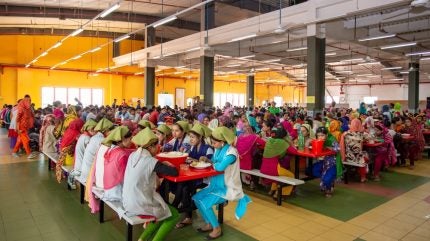
The Clean Clothes Campaign has asked US and global fashion companies to ensure the costs of Trump’s new tariff policies are not offloaded onto garment workers that can least afford it.
Instead, the NGO is urging fashion brands to absorb the costs themselves rather than pushing them down the supply chain.
The Clean Clothes Campaign’s request follows local news reports in Bangladesh that claim leading US fashion brands such as Levi and Walmart have asked for discounts from their Bangladesh factory suppliers due to the tariffs. The same reports claim that US fashion brand Gap has told its suppliers to pay the extra tariffs.
Just Style had not received a response to a request for comment from Levi or Walmart at the time of going to press, however a Gap spokesperson refuted the claims but declined to comment further.
The Clean Clothes Campaign points out current pricing is already insufficient to guarantee workers receive living wages and decent working conditions.
It states: “It is clear where the price for such forced discounts eventually will be paid: by the workers.”
The NGO is also concerned that employer federations in several garment-producing countries have already started threatening with repercussions and fallen into the trap of fostering regional competition.
It explains the threat that jobs will be relocating to other countries less affected by the tariffs, which means cuts on wages and increased working hours are being suggested.
However, it says: “It is important that workers in garment producing countries stand together in a shared approach to address this issue.”
The Clean Clothes Campaign’s message to all companies across the fashion supply chain is not to repeat the mistakes of the Covid pandemic, when “global garment companies’ knee-jerk responses to adversity solely prioritised the company’s profitability and financially devastated millions of workers already employed on poverty wages”.
It adds that given the countries with the highest tariffs already had workers on below-subsistence pay they will have no savings to fall back on: “Any renewed attempt of companies to offload costs on workers by lowering prices paid for products, cutting wages, increasing unpaid overtime or endangering jobs by relocating production, will leave workers cutting meals and increasing their debts.”
John Kernan, a senior research analyst covering retail and consumer brands at TD Securities believes the sector supply chain needs a costly reboot.
In an industry overview report he suggests: “Geopolitical tensions and now tariffs have created an existential moment for strategy behind many retailer and brand sourcing and overall cost structures.
“The industry has chased the lowest cost of goods without enough strategy on risk, which is now becoming increasingly higher.”
Kernan continues: “Making matters all the more complicated, manufacturers and materials suppliers have been pushed to incredibly high volume/lower margin positions, which suggests cost sharing on tariffs may be difficult.”
He hopes to see over the long-term a “model in apparel and footwear that can create value upstream in the supply chain. A model that can generate working capital more efficiently, turning inventory faster, and controlling accounts payables days outstanding to deliver more consistent free cash flow”.
He urges his clients and management teams to read the ‘Under The Banyan Tree: Buyers and Suppliers in Fashion’ report, which was published last year.
“It is an analysis of apparel supply chain alternatives commissioned by the International Trade Centre (UN & WTO agency for trade, Geneva). The cases and concepts for apparel and footwear manufacturers in the report align with UN Sustainability Goals 2030, especially wasteful over-production.
“We all know the softlines retail supply chain creates significant environmental issues – landfill disposal, energy cost, water pollution, and carbon emissions. Supply chain flexibility is key to recapture capital lost to excessive inventory, rather than chasing unproductive volume with lowest cost labour and long supply chain lead times,” he explains.
Bangladesh’s interim leader Muhammad Yunus urged the US to postpone its 37% tariff on all US-bound goods for three months, however Trump has continued with his tariff plan.
The global fashion industry remains concerned about the impact of tariffs as goods coming from anywhere in the world into the US are now subjected to at least a 10% tariff with further reciprocal tariffs on key fashion trading partners, such as China, Vietnam, Bangladesh and Cambodia.



